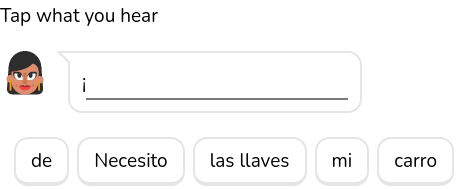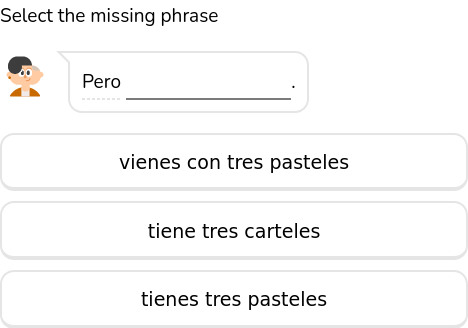Exercises
The Duostories are like the original Duolingo stories interactive, the learner is prompted with questions to make sure the learner understands the story.
Multiple Choice
[MULTIPLE_CHOICE]
> Priti can't find her keys.
+ Yes, that's right.
- No, that's wrong.
The exercise consists of a question and two or more answers.
The right answer line starts with a + sign, the others with a - sign.

Arrange
[ARRANGE]
> Tap what you hear
Speaker560: ¡[(Necesito) (las~llaves) (de) (mi) (carro)!]
~ I~need the~keys of my car
The audio is played for the learner so that the learner
now needs to reproduce the sentence by bringing the missing words into the right
order. The part between the square brackets [] will be hidden and words in
parentheses () are
converted into buttons that the user can click to arrange them.

Point to Phrase
[POINT_TO_PHRASE]
> Choose the option that means "tired."
Speaker560: (Perdón), mi amor, (estoy) (+cansada). ¡(Trabajo) mucho!
~ sorry my love I~am tired I~work a~lot
First the sentence is played in the story like a normal sentence.
Then the story hides the hints and the learner has to pick the word from the sentence with the right meaning.
Mark some words with parentheses () that will be shown as buttons. The right answer
is indicated by a plus sign + after the opening parentheses ( .

Select Phrase
[SELECT_PHRASE]
> Select the missing phrase
Speaker507: Hoy tengo [un~partido~importante].
~ today I~have an~important~game
+ un partido importante
- un batido importante
- una parte imponente
Here the audio is played for the whole sentences but a part of the sentences is hidden. This
part is enclosed in square brackets []. Then the user has to select from three
similar sounding alternatives what was really said in the sentences.

Continuation
[CONTINUATION]
> What's next?
Speaker508: Tienes cuatro botellas [de vino].
~ you~have four bottles of wine
- la mesa
~ the table
- de pastel
~ of cake
+ de vino
~ of wine
The learner sees a sentences where a part is missing. This part will also be omitted by the audio. The learner then has to fill in the gap with one of three different alternatives.
Although this seems very similar to [SELECT_PHRASE], they are different as here its about
filling in a missing word from the context whereas in [SELECT_PHRASE] is about listening to the audio.

Match
[MATCH]
> Tap the pairs
- estás <> you are
- mucho <> a lot
- es <> is
- las llaves <> the keys
- la <> the
The last exercise of a story is to match 5 words that occurred in the story with their translation.
Write the word in the target language on the left followed by <> and on the right the translation.
